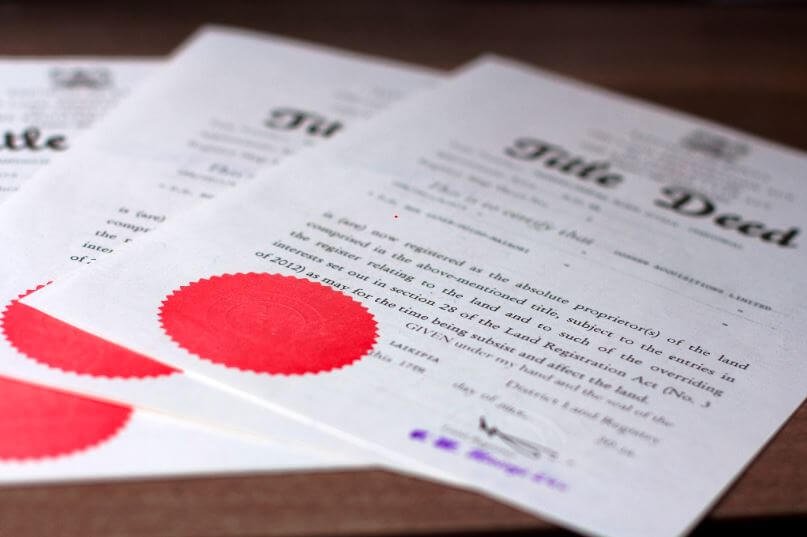Many Kenyans have become land eviction victims because of having unauthentic title deeds. Unscrupulous real estate agencies sold them plots that belonged to other entities. This is why it’s common to find a group of Kenyans owning the same piece of land without knowing. All because they don’t know how to differentiate fake and genuine title deeds before buying land.
Dishonest and wicked land sellers in Kenya will make a quick buck out of you if you’re ignorant or naive. To be on the safer side, you need to know how to differentiate fake and genuine title deeds before buying land.
In this article, we discuss the best ways to differentiate between a genuine and fake land title deed in Kenya. Keep reading for your land-buying safety.
How to Differentiate Fake and Genuine Title Deeds When Buying Land in Kenya
Authenticating a title deed is one of the trickiest stages of the land purchase process. When in doubt, consult with a lawyer and other relevant professionals. Meanwhile, here’s how to differentiate fake and genuine title deeds before buying land in Kenya:
1. Ensure the Signatures and Initials Match
If a title deed is genuine, the appearance of the signatures and initials on the original and duplicate titles will be the same. Even a small discrepancy may imply that the owner’s title deed is fake.
Find Out: How To Get NSSF Number In Kenya
2. Check the Consistency of the Property Description
Read the property description of the original title deed and the land seller’s copies. Both documents should read the same. If you notice a slight inconsistency in the text, investigate the authenticity of the land seller’s title deed.
3. Confirm the Uniformity of Serial Numbers
Each title deed contains a unique serial number that remains the same after the property changes ownership. Thus, the copies of the first title deed should have the same serial number as that of the seller. If the numbers are different, the seller has a fake title deed.
Find Out: Toyota Cars Under 500K In Kenya
4. Look for the Owner’s Duplicate Mark and the Red Seal
Another sign that a title deed is bogus is the lack of the “Owner’s Duplicate” mark. If the land owner’s title deed copy misses this label, something is wrong with it. Moreover, the absence of the red seal found on all genuine title deeds should indicate a fake copy.
If the red seal is available but appears damaged or faded, it could mean that the land seller’s copy is not genuine.
5. Register of Deeds Verification
A duplicate copy of the original title should feature the Register of Deeds’ signature. You must verify that the signature on the copy belongs to the Register of Deeds who was occupying the office at the issuance date.
If a signature is not theirs, you should question the legitimacy of the seller’s title deed.
6. Verify the Decree Issuance
An easy way to differentiate fake and genuine title deeds before buying land is by verifying the Decree issuance. Go to the State Department for Lands and Physical Planning and check if the Decree issuance is legitimate. If it is not, do not buy the land yet.
7. Check the Last Two Digits
The original title deed has a title number. The last two digits of the title number should appear in any duplicate copy. Hence, verify that the last two digits of the seller’s title number are the same ones on the original document.
If you cannot match the digits, something is wrong with the duplicate copy.
Other Crucial Measures to Take When Buying Land in Kenya
When purchasing land, find out if other people with a genuine interest in the land have consented to the sale. During the title transfer at the Land Board, this consent will be priceless.
Visit the property location with a land surveyor if you’re buying an expansive parcel of land. The surveyor will confirm the land size and location and clear any doubts. Go to the Lands Registry and conduct a title search to check if the current owner is the one you are dealing with.
If buying from an individual, look for their ID at the Registration of Persons Bureau. After the search, you’ll get their photo and ID copies if they are genuine landowners. Those buying land from an organization should search for its records in the Company Registry.
To know if the seller has duped innocent Kenyans before, look for the tracks of land and plots with a problem at the CID office. You will view the names of the people who carried out the deceptive land deals.







